- Home
- Hugh Howey
Beacon 23: The Complete Novel Page 2
Beacon 23: The Complete Novel Read online
Page 2
Instead, I’ve got someone sipping tepid coffee down in the land of women and pizza checking his readouts and telling me there’s nothing amiss. When I goddamn know something is amiss. The GWB was cool to the touch. And the alarms are going off again.
I type another quick text. The QT works with entangled particles, and they’re destroyed as they’re used, but I don’t care about budgets right now so much as not wasting time with whatever dweeb can’t do his job. I also very purposefully employ the caps button, because they can, in this way, hear us scream in space:
GWB FULL FAIL. ZERO TRANSMIT. CARGO AND LUX LINER IN TRANSIT. HARD REBOOT NO GOOD.
Get on the job, Houston.
I try to imagine people down on Earth stiffening at their consoles, rubbing the sleep from their eyes, and fixing all of this for me remotely, but I know there’s not even enough time for another reboot, not before the transit. Not sure why, but I launch back down the barrel to the GWB. Maybe just to watch, to hope nothing happens, to see the complete lack of wake as a ship passes by at twenty times the speed of light.
The GWB is still lifeless and cold when I arrive, the alarms still flashing and blaring. I turn to the porthole facing the asteroid belt—and a new star blooms into a brief and ugly existence. A blinding flash of light. Streaks of molten metal like meteors. An expanding cloud of titanium tinsel. Asteroids crashing and tumbling and knocking into one another, cleaving into smaller hunks of rock. An immense amount of destruction, all without making a sound, a macabre ballet and light show.
A large chunk of the cargo vessel flips end over end, twisted like taffy, great black gouges down the side, and everywhere are the scraps of bright red and blue and gray containers, all their contents spilling into the vacuum of space, much of it pulverized beyond recognition.
It all happens in an instant. None of the destruction is there one moment—just quietude and the mingling of hippo-like rocks—and then chaos and burning and death and space litter. This is what it looks like when a billion-ton spacecraft goes from FTL to slamming into a rock the size of a small county. When the beacon’s GWB went out, it was like the street sign before a sharp curve had been removed, the one that warns of the approaching cliff. I think of the eight crewmembers dead. Eight is the number of men in a special battalions squad. We don’t normally lose them quite this fast. Oftentimes, one will crawl away and die a slow and lonely death on the edge of space. But no one is crawling away from the disaster beyond my porthole. And five thousand more lives are inbound at twenty times the speed of light.
• 4 •
The archives deep in the heart of beacon 23 house practically every novel ever written. A random trip through the database is an exercise in frustration, as for every one novel I would enjoy, there are roughly three billion I can’t get through, and no way of telling the two types apart other than a miserable chapter or two.
Which is why I spend more time reading through the complete Wiki, circa 2245, not updated in several decades, but close enough for solar nukes and frag grenades.
My curiosity over the picture of the lighthouse keeper and the tidal wave led me deep into the Wiki searching for answers, to no avail. But before I reached out to NASA with a research request, I stumbled upon an article that beggared belief. This article comes to mind as I watch the remnants of an interplanetary cargo vessel disperse across the cosmos. It comes to mind as I see what looks like two smaller pirate-class cargo vessels moving out there among the lifeless rocks and the tinsel of torn hull. The article was about an old profession long since lost. Or so the Wiki thought.
In the days of sea-bound ships, when hulls were made to keep water rather than vacuum out, and hazards to navigation were submerged rocks, not the floating-in-space kind, there was a dishonest profession of men known as wreckers.
I wouldn’t have believed it, were it not right there in the Wiki, but wreckers did just as their name implied: they wrecked ships for a living. A brutal, murderous living.
I increased the zoom on the porthole and watched the flame of thrusters and the white puff of attitude controllers as the two black-painted cargo ships scooted from cargo container to cargo container. And the extreme coincidence of my GWB failure slid away. This was a lighthouse I was standing in, and lighthouses were not always appreciated.
Four or five centuries ago, a lighthouse would go up and down long before it went around and around. That is, some of the lighthouse would get built during the day, and then at night, many of those same stones would disappear. This would go on for months, until the builders posted guards and gave out beatings to the saboteurs. Lighthouses, you see, were bad business for the men who relied on wrecks for a living.
Wrecking probably starts with the sudden and unexpected bounty of one big catastrophe at sea. Lucky and enterprising salvagers sell the spoils that wash up beyond the reef. Before too long, clever and desperate men begin wishing for the next great crash. And so they proceed to make it happen.
In small boats, they offer to guide visiting ships through the reefs, only to take their shallow drafts over rocks that mean doom for the bigger ships. Or they light fires to show harbors that don’t exist. They forge sea charts. They rig chains across channels. The lives lost are of less consequence than the spoils gained. In every wreck and crash, there is some unseen man rubbing his hands with thoughts of tidy profits.
Lighthouses, then, are not to be tolerated. NASA hates it when we refer to beacons as lighthouses. Maybe they don’t want to give any deplorable types any deplorable ideas.
In the distance, beyond my beacon, in a realm of space where I can go weeks without seeing another living soul, I watch some such deplorable people go about their business, and I’m powerless to stop them. I’m also reminded that there’s no such thing as coincidences. My little lighthouse on the edge of sector eight was taken down, brick by brick.
I shove away from the porthole and down the barrel again, needing to tell Houston. “We have a problem,” I hear myself thinking. But no one writes that anymore. We only get in touch with Houston when we have a problem. No point in wasting entangled particles on the redundant.
Sabotage, I type into the QT. There’s no all-caps. Watching the cargo explode into countless pieces, and the equivalent of a squad die at the hands of pirates, has left me numb. Reboot unsuccessful. I backspace and change to Reboot failed. Please advise.
I hit “send.” Then “confirm.” And finally: “Yes, I’m sure.”
The machine beeps. At least it’s a good little noise. So much of the beacon must’ve been fucked with all at once, including the QT error reporting to Houston. And this is when the big realization hits me like a sack of bricks. This is when my months-long torment with the little sounds makes me feel less insane. In the minutes since I realized my beacon has been hacked by wreckers, I’ve assumed it was done from the outside. Some way of getting around NASA’s supposedly iron-tight security measures. Some brilliant hack.
Then I think about a trade I made with some unseemly characters a while back. I think about the other ship that dropped off my research request and then proceeded to steal ore from the belt. In the days of wooden ships, pests came on with boxes of fruit. Cockroaches hatched from eggs laid in cardboard. Rats found their way into the bilges, where they had more rats. What the fuck have I done?
I think of the sounds that seemed to scurry out of the way whenever I got near. And suddenly, I’m not alone in the beacon. I scan the walls of knobs and displays. There are pipes running everywhere around me, bundles of wire drooping from the ceiling, open panels from recent projects that allow me to peek into the innards of NASA’s little creation. And the creepy-crawlies are everywhere. Watching me. Little metal insects that don’t get caught in my traps, because they’re the wrong kind of traps.
I check the time. Ten minutes before the Varsk passes these waters. Waters. Taking the imagery too far. Or maybe it’s because I feel like I’m drowning. Back in the war zone. A medal pinned to my chest in a hospital, pinned the
re for saving a fraction of the lives that are about to be lost because of me. There won’t be any photos of this. Just headlines of an accident. Five thousand dead. And I’m still a hero, smoking my pipe, that awful wave reaching up behind me.
The QT beeps with a message from NASA.
Sitrep
“Situation report?” I ask the void. I say to the creepy crawlies, to no one in particular: “Situation normal, motherfuckers. I screwed up.”
I bang my palm on the screen closest to me, and the green phosphorous readout wavers for a moment. Wreckers. I’ll be lucky if they don’t kill me. Lucky they haven’t already. I need to get a message off to NASA to warn them of future hacks like this. Social hacks are always the easiest way in, because people like me are the weakest link. I don’t worry about the QT costs. I hammer out a quick explanation, a best guess:
Took on illicit delivery. Bugs in the shipment, metal kind. Some kind of hack. Took down all the systems at once. Check other beacons. Look into history of Wreckers. Pirates taking cargo. Not sure if they’ll fix the beacon. Lux liner with 5k pop heading this way. Reboot may have worked, but they just shut GWB off as soon as it came on.
I hit send. I confirm. But before I can say “I’m sure,” I think about my explanation. Is it right? There was definitely a delay before the alarms came on, like maybe the reboot worked but then the GWB was shut down again. Does that mean the critters are still here, watching me? Is there anything I can do about them?
Staring down the barrel toward the lighthouse, I think of a disinfectant. I think of war, where some lives are lost in order to save others. Where even eradication is a thing we’ll consider. Where the greatest evils become the greater goods.
My hand is on my bare stomach, rubbing cords of knotted flesh, the raised welts of scars that tell a story. I stop this. There’s no time for that. No time but to act.
• 5 •
There’s a run of wire overhead to send power out to the red docking target, the big red O that guides in supply ships. I grab this and give it a good yank, pulling it free from its velcro harness. Finding my snips, I hack one end of the wire and tug enough from the chases for what I’ll need. I grab a wrench and boost myself down the barrel to the lighthouse.
The GWB is still exposed, its panels lying on the floor. The clock on the wall is showing me the wrong time. I almost wish it were wound, wouldn’t mind the ticking. I’d love to know how much time I have left.
I cut the power feeds to the GWB. The voltage for it and the docking lamp are both 220, if I remember the schematics right. Been a while since I had to know this shit. With the wrench, I loosen the six bolts that hold the gravity wave broadcaster dome to its mount, like removing the light fixture from a lighthouse. I get it free and leave the wrench behind. Cradling the GWB like a beach ball, I move slowly down the barrel toward the control room, turning before gravity takes over, landing in a crouch.
I leave the GWB in the middle of the floor, near the coil of wire. Down the ladder and to the fuses again. I put my back into them, and they turn a little more easily, maybe from being worked back and forth already. When the power goes out, I head for the ladder, not waiting for my eyes to adjust or the emergency lighting to come on. Bump and fumble, I’m up two rungs before I can see again. A humming somewhere of power winding down in a pump or a spinning fan. The chiming of my bare feet on the rungs.
I strip the ends of the docking target power cord and splice them to the GWB. The creepy crawlies are watching me. Little metal legs twitching. Infrared cameras curious. Poised by the beacon’s relays and electrical inputs with their little instructions to wreck shit. I tell myself this, even though I don’t know. Even though I suspect I’m just a little bit crazy. Even though it might all be in my head.
Three minutes. The splices are shit, but should relay enough power. Enough to fry batteries and electronics for a few-meter radius. Any chips not built to handle it. Anything that can’t do a hard factory reset.
Back to the power relays, sliding down the ladder with hands and feet on the outer rails. Bruising my heel on impact. Limping over in the glow of the emergency lights. I throw the breakers, imagining old men with gray beards peering in at me through the portholes, watching this idiot ruin their simulation, making notes on their clipboards, shaking their weary heads.
First breaker makes contact, and the lights come on. Then the next. There’s a pause while the GWB warms up, then a series of pops and hisses as it fries everything nearby. No time for alarms. Darkness descends. A flickering, unsteady, then absolute darkness.
Back up the ladder now, this time with no lights. Nothing. Just my labored breaths, the slap of palms on the ladder, the ticking of an internal clock, the thought of all those people in that liner, and all the other people I couldn’t save. Corpses. Bones. Grinning skeletons. Friends and brothers in combat suits, that befuddled look on faces just before the lights go out inside, even though they know what’s happening, even though they’ve expected it for years since boot camp, even though they’ve seen it before with their buddies, but the last part that goes is the little sliver of hope that thought you’d get through this mess, that thought you’d live to see the other side, that it’d be your name on the war memoir, on the cover, not in the dedication.
I find the GWB by crawling around and groping in the pitch black. Find the wires. Yank them free. Then crawl back to the ladder to do it all again. Exhausted. Like PT. Forced marches. Don’t get enough exercise in this place. My stomach hurts, but it’s probably just a stabbing recollection. A painful memory. Nothing more.
I throw the breakers for what I hope is the last time. Another factory reset, all those chips rebuilding themselves, software going back to primitive states, power flickering on, the beeps and whirrings and hissings that are supposed to be there.
I wonder if the wreckers anticipated this, if their little bugs have self-healing CPUs. They do or they don’t. No time to waste dwelling on it. I’m back up the ladder, my arms quivering, my legs numb, wishing I’d killed the gravity before I started this. That would’ve been smart. A good soldier would’ve thought of that.
I grab the GWB and pull myself down the barrel. In the lighthouse, the porthole is still zoomed in on the debris. Motion and activity out there, the motherfuckers. I only tighten two of the bolts before I grab the wires. No time to go back and shut off the power while I juice it up, so I decide to splice it on hot. Negative first, careful not to touch the wires together or to the same metal surface. Then the positive, sparks flying right as they touch, but settling as I wind the copper ends tight to each other.
I sit back. Listen for the hum. Place a hand on the dome. Is it getting warm, or is that my heat? My sweaty palm?
There is no clock. But I know the time is short, and that the only way I’ll know if it didn’t work is a sudden bloom of light that fills the portholes, another great wreck to sift through, this time full of bodies and all their valuables. I think of the wreckers of old who sorted through wooden chests and gathered planks and coils of rope while corpses washed up on the beach. I see men in zero-gee pulling the boots off the drowned. Digging through pockets. Yanking gold chains from necks. Sucking on lifeless fingers to loosen rings.
Then I see a scared little soldier sitting in a muddy trench on an alien world, finger on the trigger, just needing to shoot. To shoot. The boys all around are shooting, and they’re ending up dead. The best thing I ever did in life was nothing, and I got a medal for it. I was a hero once. And if you look at my picture, that’s all I’ll ever be.
Minutes pass. Hours. I’m sobbing with relief. Nothing happened. Nothing. The unseen wake left by five thousand squirming souls as they pass me by at twenty times the speed of light. On they go, leaving me here, sobbing. Eighteen more months on this shift, alone, my back to the sea, tending to my little beacon with all its pretty little noises.
Part Two: Pet Rocks
• 6 •
When a trans-orbital cargo ship traveling twenty times the sp
eed of light bumps into large, stationary rocks, it makes quite a scene.
I can attest.
I am witness.
According to the labcoats at NASA, I might be the only soul to see such a spectacle with his own eyes and live to tell the tale. Besides the asshole pirates who caused the ruckus in the first place, I have to remind them.
Thinking about the picture of the lighthouse operator up in the business end of my beacon, I find myself wondering if any of those old keepers felt this empty, gnawing, hungry, depressed sensation after a ship was lost on their rocks. I wonder if they felt this helplessness, this dread, this sense of duty derelictioned—if that’s even a word. Did they watch for weeks as planks of wood and tangles of rope washed up on their shores? Did they feel as though they didn’t do quite enough? That the blood out there was on their hands?
I hope not. I wouldn’t wish this on anyone, much as I crave the company, much as I wish I didn’t feel so alone. It’s a selfish craving, desiring a partner in misery. The brotherhood of war was a lot like this. You didn’t want your squadmates to be there, suffering with you, but you couldn’t have made it through without them. You wanted them home as badly as they wanted to be home, but only if you all got to go at once. I’m pretty sure every one of us was thinking: Don’t leave a man behind—especially not me.
It’s been seven days since the wreck, and I haven’t slept much. I have no appetite. I keep telling myself it was only eight dead, which would’ve been a great day along the front, but maybe it’s the near-miss of the passenger liner that keeps me up at night and has me skipping my morning bowl of protein mix. Even though the passenger ship passed by without incident, I can somehow see five thousand bodies tumbling out there among the rocks. I can hear their families weeping. None of them know how close they came. But I do. I get the shakes when I think about it. I concentrate instead on the four men and two women who did die out there, and I run everything over and over in my head, wondering what I could’ve done differently.

 Refuse (The Silo Archipelago Series Book 1)
Refuse (The Silo Archipelago Series Book 1)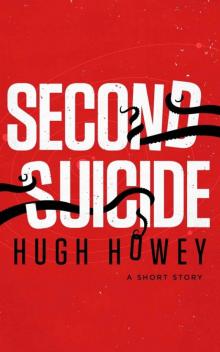 Second Suicide: A Short Story
Second Suicide: A Short Story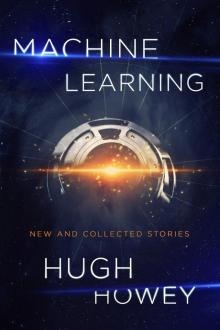 Machine Learning: New and Collected Stories
Machine Learning: New and Collected Stories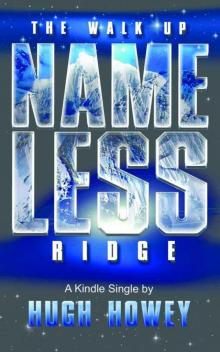 The Walk Up Nameless Ridge
The Walk Up Nameless Ridge Half Way Home
Half Way Home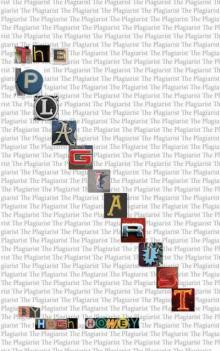 The Plagiarist
The Plagiarist Peace in Amber
Peace in Amber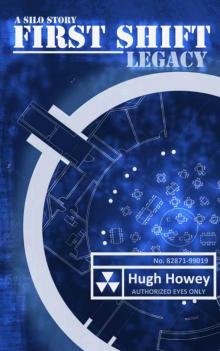 First Shift: Legacy
First Shift: Legacy Wool
Wool Glitch
Glitch Shift
Shift Dust
Dust Molly Fyde and the Land of Light
Molly Fyde and the Land of Light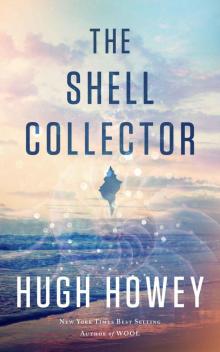 The Shell Collector
The Shell Collector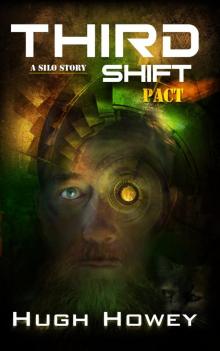 Third Shift: Pact
Third Shift: Pact Molly Fyde and the Fight for Peace
Molly Fyde and the Fight for Peace Sand Omnibus
Sand Omnibus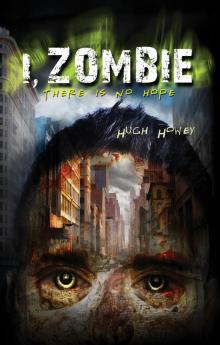 I, Zombie
I, Zombie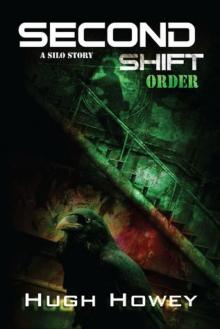 Second Shift: Order
Second Shift: Order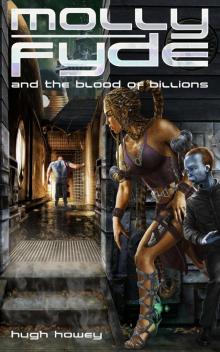 Molly Fyde and the Blood of Billions
Molly Fyde and the Blood of Billions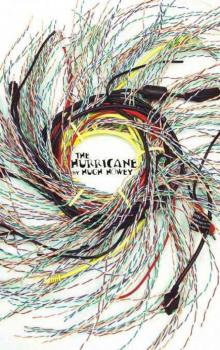 The Hurricane
The Hurricane The Box
The Box Glitch_A Short Story
Glitch_A Short Story Molly Fyde and the Land of Light tbs-2
Molly Fyde and the Land of Light tbs-2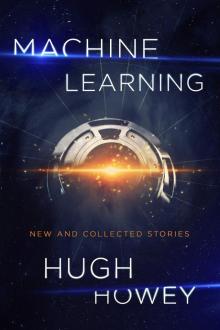 Machine Learning
Machine Learning Resist
Resist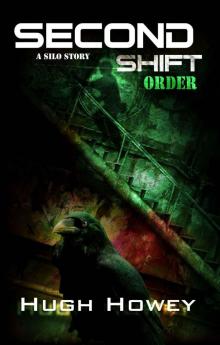 Second Shift - Order (Part 7 of the Silo Series) (Wool)
Second Shift - Order (Part 7 of the Silo Series) (Wool)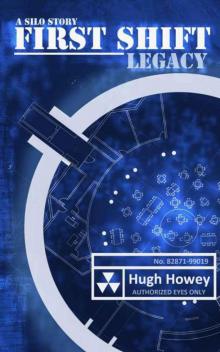 First Shift - Legacy s-1
First Shift - Legacy s-1 Stories on the Go: 101 Very Short Stories by 101 Authors
Stories on the Go: 101 Very Short Stories by 101 Authors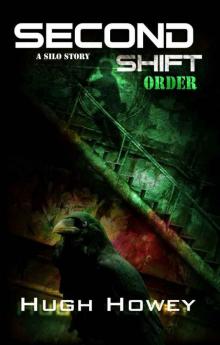 Second Shift - Order s-2
Second Shift - Order s-2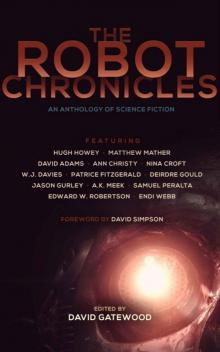 The Robot Chronicles
The Robot Chronicles Molly Fyde and the Blood of Billions tbs-3
Molly Fyde and the Blood of Billions tbs-3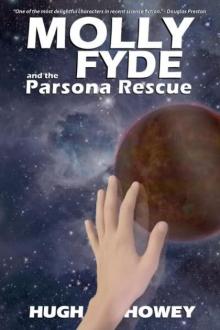 Molly Fyde and the Parsona Rescue tbs-1
Molly Fyde and the Parsona Rescue tbs-1 Molly Fyde and the Fight for Peace tbs-4
Molly Fyde and the Fight for Peace tbs-4 Sand
Sand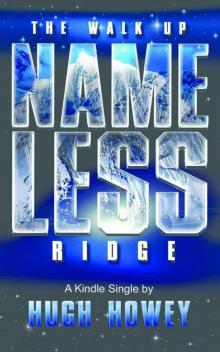 The Walk Up Nameless Ridge (Kindle Single)
The Walk Up Nameless Ridge (Kindle Single) Wool Omnibus Edition (Wool 1 - 5)
Wool Omnibus Edition (Wool 1 - 5) The World of Kurt Vonnegut: Peace in Amber
The World of Kurt Vonnegut: Peace in Amber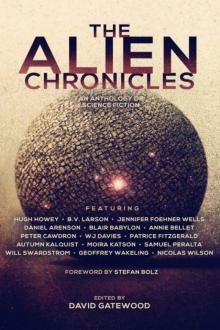 The Alien Chronicles
The Alien Chronicles Glitch: A Short Story (Kindle Single)
Glitch: A Short Story (Kindle Single)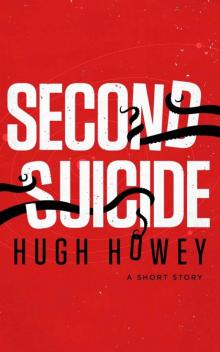 Second Suicide: A Short Story (Kindle Single)
Second Suicide: A Short Story (Kindle Single) Shift (silo)
Shift (silo)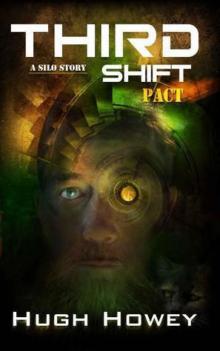 Third Shift - Pact
Third Shift - Pact Dust s-9
Dust s-9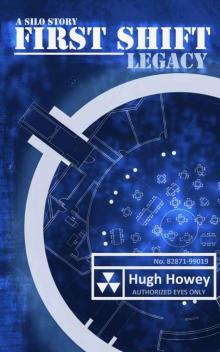 First Shift - Legacy (Part 6 of the Silo Series) (Wool)
First Shift - Legacy (Part 6 of the Silo Series) (Wool)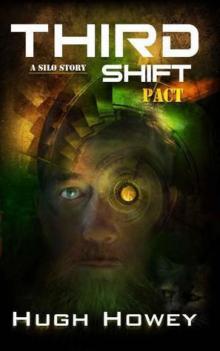 Third Shift - Pact s-3
Third Shift - Pact s-3 Sand: Omnibus Edition
Sand: Omnibus Edition The Box: A Short Story
The Box: A Short Story